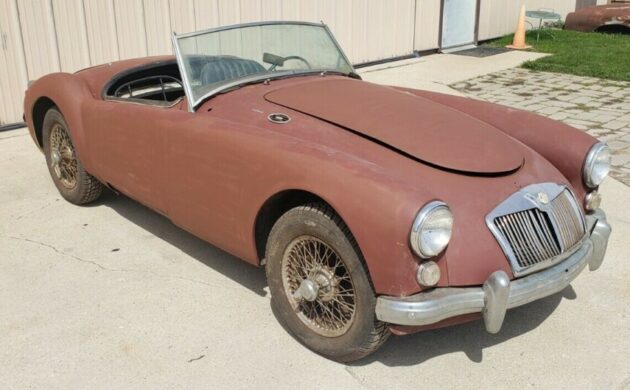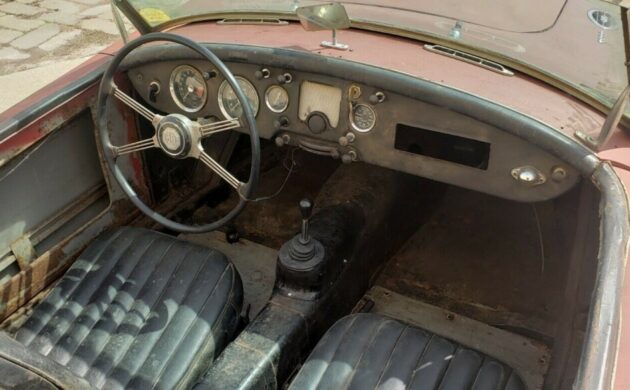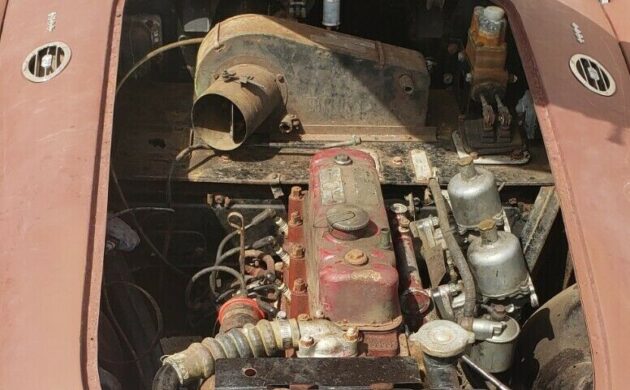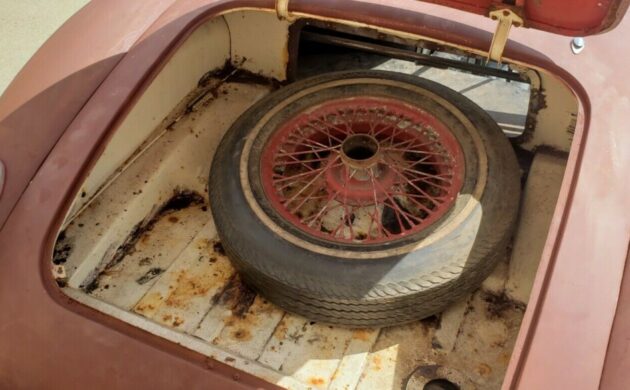In 1955, MG introduced a swoopy new sports car to follow the aging MG TF: the MGA. Its design was penned by Syd Enever, based on a car raced at Le Mans in 1951. The first cars were equipped with a 1489 cc B series motor fitted with dual SU H4 carburetors; this model was referred to as the MGA 1500. Brakes were Lockheed drums all around. At about 72 bhp, performance was not enthralling but the new car sold well. In 1959, a 1588 cc motor was supplied and the car gained Girling disc brakes in front. The MGA 1600 had 80 bhp on tap and the top speed improved to nearly 100 mph. These cars are perfect for amateur restorers since the body can easily be taken apart right down to the frame. And when you get that far, you’ll discover heavy plywood floors seated on the frame rails, no welding needed (handy tip: use marine-grade plywood when you replace these). Practice your skills on this MGA 1600 roadster, available here on eBay, selling at no reserve but looking for a first bid of $5,400. The car is located in Sandwich, Illinois.
The owner indicates he bought this car in pieces and tacked it together for its photoshoot, without making much effort to fit the panels. Sill work will be necessary, and the nose is not straight. It has no wiring harness, brake lines, fuel lines, or hoses. Some rust holing is mentioned. The interior shows as substantially stock, with the original delicate shift knob, and banjo steering wheel – even the radio speaker grille is intact. Several tough-to-find trim bits are present, including the cockpit rails and the demist vents. The car has its top frames but no top.
The owner indicates that the engine was rebuilt twenty years ago but never ran and is now stuck. The SU carburetors retain their brass dashpot dampers but the air cleaners are missing. The valve cover still has its metal cap; these are often replaced with plastic versions. The washer fluid bottle is missing.
The trunk contains the spare which is missing its hold down. We think we see the hand crank, too. The crank should be clipped inside the trunk above the spare, but it appears it is instead tucked inside the passenger compartment. The finish reveals that this car may have been Old English White; the British Motor Museum offers Heritage Certificates that will confirm an MG’s configuration when it left the factory. In sum, MGAs are fun and relatively reliable. Parts are substantially available. Enthusiasts abound, and many are eager to help bring cars like this one back to life. Would this little gem fit in your garage?







Might be a good buy but wouldn’t pay more than the opening bid. Neat cars but this one will take up a lot of time and money to restore. The designers of the B and A series MGs really got it right.
Undervalued. Grab it!
Perfect for a miata drive train.
I’d like to a v-tec Honda motor. Suspension upgrades, and build my own harness. Etc…
Unless you are a hobyist and restore it yourself at the standard hobyist rate of 15 cents per hour, the car theoretically has no value because restoration would cost more than what the car would be worth. That said, I suppose the parts are worth a few thousand, so I would value it at $3 to 4,000.
AGREED! the final sales value after sweat, labor, and $ does not substantiate the effort. EXCEPT that you end up with a beautiful vehicle. This is why I continue to attempt to wake up the the general ownership of these cars to the value of their efforts and hold out on giving their cars away. Take a look at a few properly restored MGA’s having 5 speed Japanese transmissions, the coil over front suspension kit, even the rare 2.0 engine, or other reliable mills, and having addressed overheating and many other original weaknesses. This is simply a nice looking body design car that cannot be had so inexpensively comparatively.
Is there such a thing as a restoration project car you can make money on paying a professional to do the work? Never heard of one – not an E-Type, Ferrari GTO, or an MGA. Just add zeros to the amount your upside down with more exotic projects.
Most people who are going to pay to restore a car, either doing the work themselves or having someone else do it rarely embark on such an adventure thinking about turning a profit.
They usually do it for some sentimental value, the experience and enjoying the work, or just a love of the vehicle.
I dont think I have ever meet someone who funded a restoration project like this just for the potential profit.
It really doesnt matter what car it is, if its to the point of needing a full on restoration, you are never going to get out of it what you put into from a monetary perspective.
So, you are suggesting that no restoration is profitable? I am a professional parts restoration facility dealing with the 1% every day. Yes, The “Labor of love factor” is prominent. However. I assure you that Hyman LTD and auction houses are not loosing money. The higher valued cars that they deal with can sell for more because of rarity, dedication to preservation, their history, and prominance of marque. The MGA was a car for the proloteriate. and not often seen in many of the afore mententioned desireable areas” of higher value. Yet, I feel a landmark car in design, and more valuable than $30 grand when properly finished. More smiles per mile is still true!